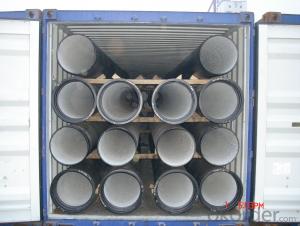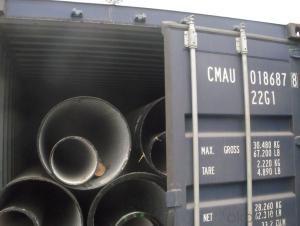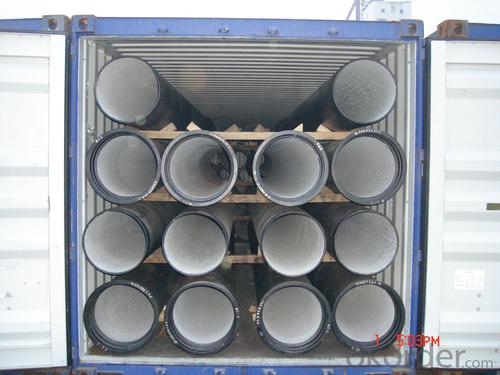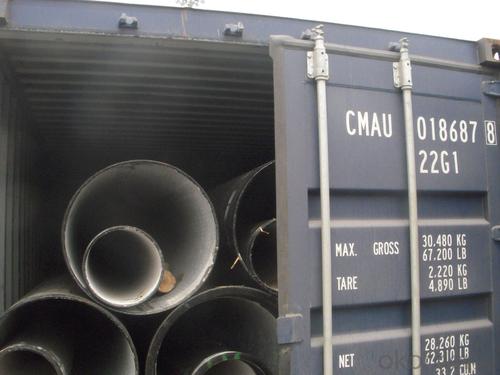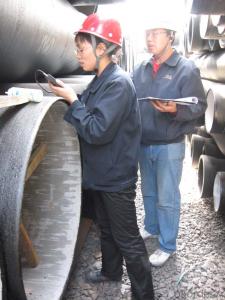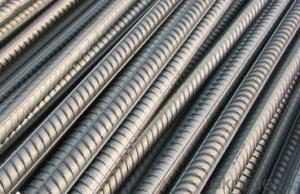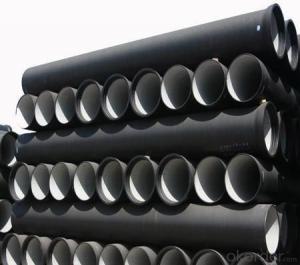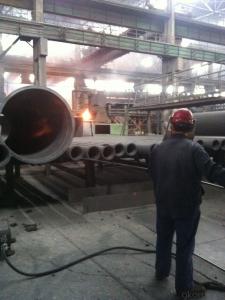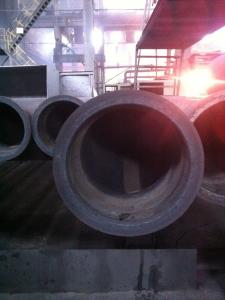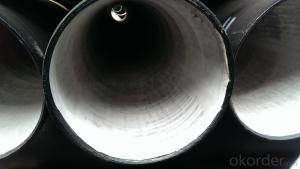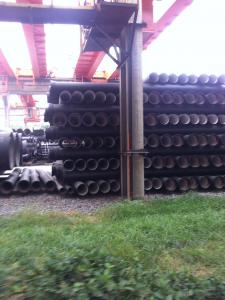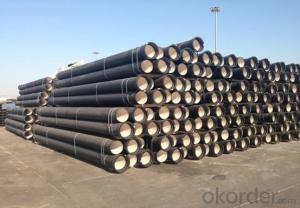DUCTILE IRON PIPES AND PIPE FITTINGS k9 CLASS DN1800
- Loading Port:
- Tianjin
- Payment Terms:
- TT OR LC
- Min Order Qty:
- 22 pc
- Supply Capability:
- 3000 pc/month
OKorder Service Pledge
OKorder Financial Service
You Might Also Like
Material : Ductile Cast Iron
Size Range : DN 80mm to DN 2000mm
Unit Effective Length : 6m or 5.7m
Manufacture Standard: ISO 2531:1998/ EN 545:2006/EN 598:2007
Annual capacity : 200,000 tons
Coating Exterior: Zinc 130g/m2 according to ISO 8179-1 and bitumen coating 70 microns.
Cement Interior: Portland Cement/ High Alumina Cement/ Sulphate Resisting Cement Lining according to ISO 4179
Special requirements on external coating and internal lining can be applied
We also provide accessories such as SBR/EPDM rubber gaskets, lubricant paste, pipe caps, PE sleeves, etc.
Additional Parts:
Each pipe is strictly inspected according to related standard to ensure permanently high performance.
Easy Installation at site and service free for life
Long Service Lifespan
Quotation will arrive you within 24hours once we get your inquiry.
We guarantee offering you a competitive price.
A copy of original inspection reports of pipes will be offered after shipment.
Photos of loading process will be sent to the customer after shipment effect.
We will follow-up the delivery progress after shipment effect and update to the customer on weekly basis.
- Q: Can ductile iron pipes be used for underwater installations?
- Indeed, underwater installations can make use of ductile iron pipes. Ductile iron, renowned for its robustness and longevity, exhibits a remarkable resistance to corrosion, rendering it well-suited for submerged applications. Moreover, the exceptional joint integrity of ductile iron pipes guarantees their impermeability, even when subjected to substantial hydrostatic pressure. To bolster their resistance to corrosion and prolong their lifespan in underwater settings, these pipes are often coated with protective linings and coatings. All in all, ductile iron pipes are a dependable option for underwater installations due to their formidable strength, durability, and corrosion resistance attributes.
- Q: What is the expected fire resistance of ductile iron pipes?
- The expected fire resistance of ductile iron pipes is high due to their ability to withstand high temperatures without losing structural integrity. They have a melting point of approximately 1200°C, making them suitable for applications where fire protection is crucial.
- Q: Can ductile iron pipes be used for irrigation of sports fields?
- Yes, ductile iron pipes can be used for irrigation of sports fields. Ductile iron pipes are known for their strength, durability, and flexibility, making them an ideal choice for various applications, including irrigation. These pipes have high resistance to external pressures and impact, which is beneficial for sports fields that may experience heavy foot traffic and potential damage. Additionally, ductile iron pipes have excellent corrosion resistance, ensuring long-term performance and minimal maintenance. Their smooth interior surface also allows for efficient water flow, preventing clogs and ensuring adequate irrigation for the sports fields. Overall, ductile iron pipes are a reliable and suitable option for irrigation systems in sports fields.
- Q: Are ductile iron pipes suitable for installation in areas with high traffic loads?
- Yes, ductile iron pipes are suitable for installation in areas with high traffic loads. Due to their inherent strength and durability, ductile iron pipes can withstand heavy loads and are commonly used in applications where there is significant vehicular traffic.
- Q: Which is better, ductile iron pipe and spray plastic pipe?
- Spray pipe is: plastic composite pipe, steel pipe is a new composite material as matrix, through a special process in high temperature curing by walls melt spraying or adsorption of food grade epoxy powder coating or PE as raw material. It has excellent corrosion resistance and relatively small frictional resistance.
- Q: Are there any special considerations for installing ductile iron pipe in rocky soils?
- Yes, there are special considerations for installing ductile iron pipe in rocky soils. The presence of rocks can pose challenges during the installation process as they can cause damage to the pipe or impede its proper alignment. Therefore, it is important to carefully assess the soil conditions and rock content at the installation site. Additional measures such as proper bedding and backfilling techniques, using protective coatings or linings, and employing specialized equipment may be necessary to ensure the durability and longevity of the ductile iron pipe in rocky soils.
- Q: What are the interface forms of ductile iron pipes? The best drawings are available. Thank you
- Because of this interface and the corresponding T sealing aprons can withstand greater deflection angle and greater tolerances, especially suitable for unstable formations and corners.
- Q: How are ductile iron pipes protected during transportation and storage?
- Various methods are employed to protect ductile iron pipes during transportation and storage, ensuring their integrity and preventing potential damage. The first step involves applying a protective layer, such as epoxy or zinc, to act as a barrier against corrosion. This coating effectively safeguards the pipes from moisture and other corrosive elements during transit and storage. To further safeguard the pipes, they are often bundled together and secured with straps or bands, preventing any movement or shifting that could cause mechanical damage. This bundling not only ensures the pipes remain intact but also facilitates easier handling and transportation in an organized manner. During transportation, the pipes are typically loaded onto pallets or placed in crates, providing additional protection and stability. This minimizes the risk of accidental impact or rough handling that may result in cracks or fractures. Proper labeling and marking of the pipes is crucial to ensure appropriate handling. This includes displaying handling instructions, weight limits, and pipe specifications, preventing mishandling and damage during transportation. Equally important are the storage conditions for maintaining the integrity of ductile iron pipes. They should be stored in a clean, dry, and well-ventilated area, protecting them from moisture and humidity. Direct sunlight and extreme temperatures should be avoided to prevent any potential degradation of the protective coating. In conclusion, protecting ductile iron pipes during transportation and storage involves the application of protective coatings, bundling and securing, suitable packaging materials, proper handling and labeling, and storage in appropriate conditions. These measures guarantee the pipes' quality and structural integrity, ensuring they arrive at their destination in optimal condition.
- Q: Can ductile iron pipe be used for marine applications?
- Yes, ductile iron pipe can be used for marine applications. Ductile iron is a type of cast iron that possesses high strength, durability, and resistance to corrosion. These properties make it suitable for various marine environments, including saltwater applications. Ductile iron pipes are commonly used for marine applications such as seawater intake and outfall systems, offshore oil and gas platforms, submarine pipelines, and marine dredging projects. The corrosion-resistant nature of ductile iron helps protect against the harsh conditions found in marine environments, such as corrosive saltwater, tidal currents, and marine organisms. Additionally, ductile iron pipes are known for their excellent mechanical properties, including high tensile strength and impact resistance, which further enhance their suitability for marine applications. Overall, ductile iron pipe is a reliable and cost-effective choice for various marine applications.
- Q: Can ductile iron pipes be used for underground cooling water systems?
- Ductile iron pipes are suitable for underground cooling water systems. They are renowned for their durability, strength, and resistance to corrosion, making them ideal for various applications, including underground installations. In cooling water systems, where pipes encounter water and potentially harsh environments, ductile iron pipes offer a dependable and enduring solution. Their capacity to withstand high pressure and temperature variations also guarantees the efficient and secure operation of the cooling water system. Moreover, ductile iron pipes are frequently favored for underground installations because they are easy to install, require minimal maintenance, and are cost-effective.
Send your message to us
DUCTILE IRON PIPES AND PIPE FITTINGS k9 CLASS DN1800
- Loading Port:
- Tianjin
- Payment Terms:
- TT OR LC
- Min Order Qty:
- 22 pc
- Supply Capability:
- 3000 pc/month
OKorder Service Pledge
OKorder Financial Service
Similar products
Hot products
Hot Searches
Related keywords
